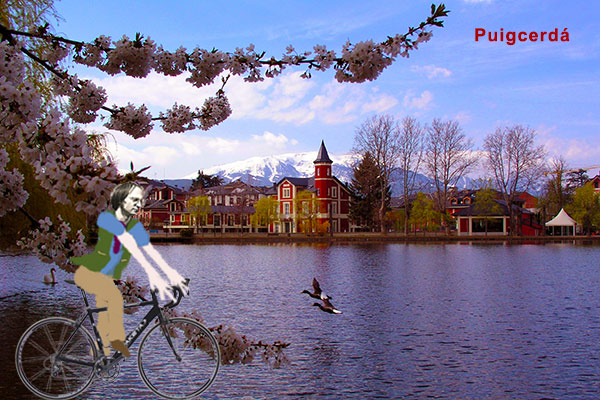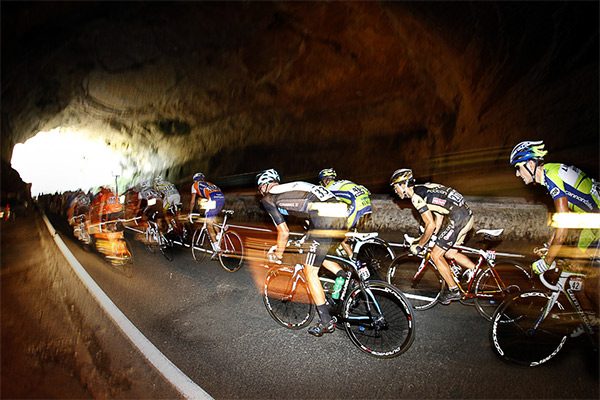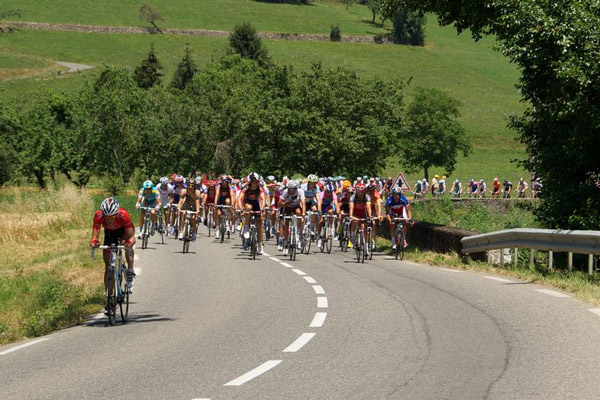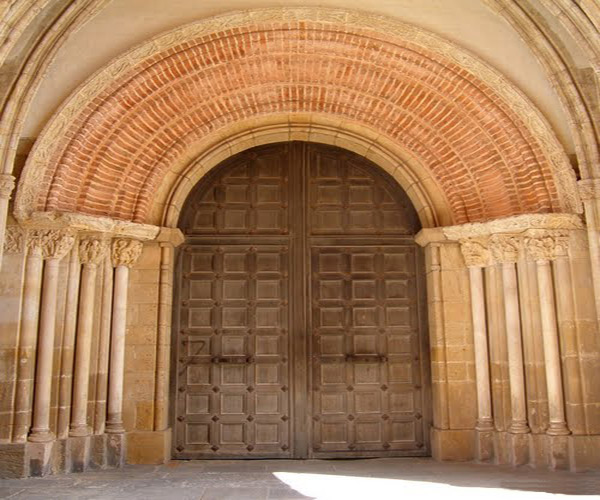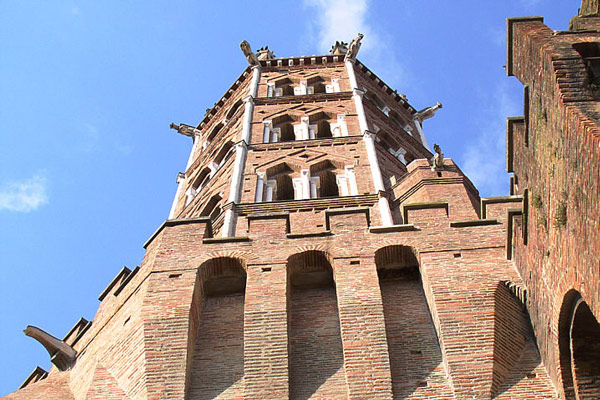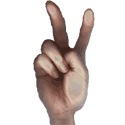Puigcerdá ⇒ Foix ⇒ Pamiers ⇒ Toulouse ⇒ Montauban ⇒ Brive-la-Gaillarde...
240 miles northward.
To convert miles to kilometers, add 100% of the miles to 50% of the miles plus 10% of the miles plus 1% of the miles.
Thus, 240 miles = 240 + 120 + 24 + 2.4 = 386.4 kilometers,
or just pull out your smart phone and multiply the miles by 1.61.
Leaving off the last 1, and multiplying by 1.6 is usually close enough unless you are tripping to the Moon or Mars...
On this day trip, I was retracing my route from
Toulouse
Thought of writing about Toulouse-Lautrec here on this page, but he was born in Albi.
to Brive-la-Gaillarde — a route made famous by bikers in the Tour de France on their way to the Pyrénées.
Daydreamed of competing in the Tour de France, but, for some reason, I was pedaling the wrong way.
Embarassing...
I have never been much of an athlete or a sport. I never acquired the masculine poetics of ball chasing. Unless you consider tracing planetary orbs as chasing balls, lusting over ovary substitutes of various sizes was not in my genes. I inherited the bald gene, not the ball gene. Like most guys, I never enjoyed losing, but I also felt badly when I won at the expense of another's loss — too much empathy or estrogen, I guess. OK, so I could hit the ball further than others in the sixth grade because I was bigger than others. Big deal. Ball chasing was never my thing, which disappointed my dad somewhat. Since I was a leftie, he wanted me to play first base. He bought me a first base mit for my 8th birthday and put me on a cub scout team, where I was almost good enough to stand out in left field. One afternoon, outstanding in my field, and crying with shame, a pop fly landed in my glove. Miracle you say? Not enough to make me an enthusiast for the sport, although Dad tried his best by taking me to all the major league teams in New York and Chicago: Yankees, Giants, Dodgers, White Sox, Cubs. Sorry, Dad — boring... After Dad died, I switched to chess, became an obsessed fanatic; but once again, I hated losing and felt guilty winning. So I made a movie, the animated equivalent in quality to Santa Claus Conquers the Martians, about a chess game that only I could win or lose. I did both. I won confidence that I could finish any task, but I lost many years in a failed obsession. You gotta know when to hold 'em, know when to fold 'em. I did not.
Biking is different from most sports. You are not ball chasing. You are traveling. I became a biker on my 7th birthday when I received a new Schwinn. I immediately ran it into a tree. I have owned 5 bikes in my lifetime and 2 cars. I bought my first car when I turned 40, but soon left it to rust in Max's driveway, and returned to biking. I am not a racing fan. The Indianapolis 500 roar is a bore. No scenery. I also don't care for bike racing — whether Lance Armstrong or some other biker wins, doped up on drugs or not, does not matter to me — but I love the scenery. Wish there were a Tour de Tennessee.
There is another game I learned to play too late in life — a game called Mathematics —
the hardest game I know, where everyone loses and everyone wins, even those who do not play.
From the small town of Pamiers, a math textbook was discovered in the early 1980's in a library in Paris.
Someone had checked it out 500 years ago and never returned it?
Compendi del Art del Algorisme, or simply the
Pamiers Manuscript, 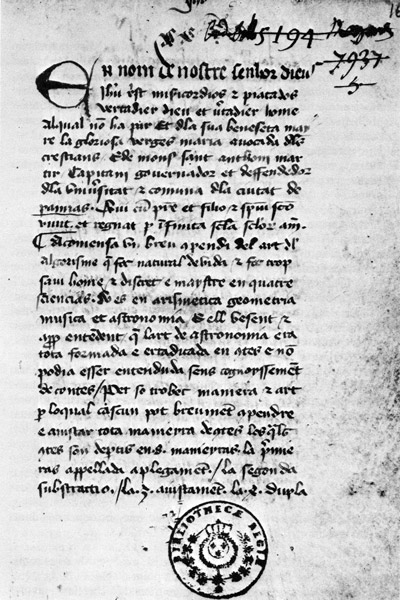 is a rare copy of a textbook in arithmetic that taught school kids and future merchants
how to add, subtract, multiply, divide, and bankrupt yourself in uniquely creative ways.
Without such texts and the Islamic symbols therein, the riches of capitalism would have remained unknown.
No cell phones. No shopping malls. No flash mobs. No Tour de France. No baseball stats.
Without the math in this text, there would be no world as we know it.
is a rare copy of a textbook in arithmetic that taught school kids and future merchants
how to add, subtract, multiply, divide, and bankrupt yourself in uniquely creative ways.
Without such texts and the Islamic symbols therein, the riches of capitalism would have remained unknown.
No cell phones. No shopping malls. No flash mobs. No Tour de France. No baseball stats.
Without the math in this text, there would be no world as we know it.
Like most games, math is learned by doing. In collecting data for my doctoral dissertation, I discovered that those students who were expected to do something in their majors — artists, musicians, and athletes — always outperformed mathematically those majoring in traditional academic subjects such as English, history, or philosophy. Unfortunately, someone since the Compendi del Art del Algorisme was printed had decided that the lecture method, beloved by academia, was the appropriate way to teach students their maths. For bureaucrats who need to produce numbers, lectures followed by tests, have always been the most efficient way to gauge/gouge a student's progress, especially in mass education systems, which we all suffer from. It becomes more obvious as the computer age evolves that individuals working one on one with their computer is a more efficient means of learning your algorithms — plus you may actually learn to think a little too.
Tonight, I slept somewhere close to Brive-la-Gaillarde, well-known for both its bakers and bikers.

Two men leave on the same day and the same hour from two cities, say for example the first leaves Béziers for Barcelona and the other goes from Barcelona to Béziers. And the one that leaves Béziers does the route in 7 days, and the other takes 9 days. I ask how much time is required before they see each other, and, if the cities are separated by 63 leagues, how far each has traveled.—Compendi del Art del Algorisme, translated by Jacques Sesiano (1984)
